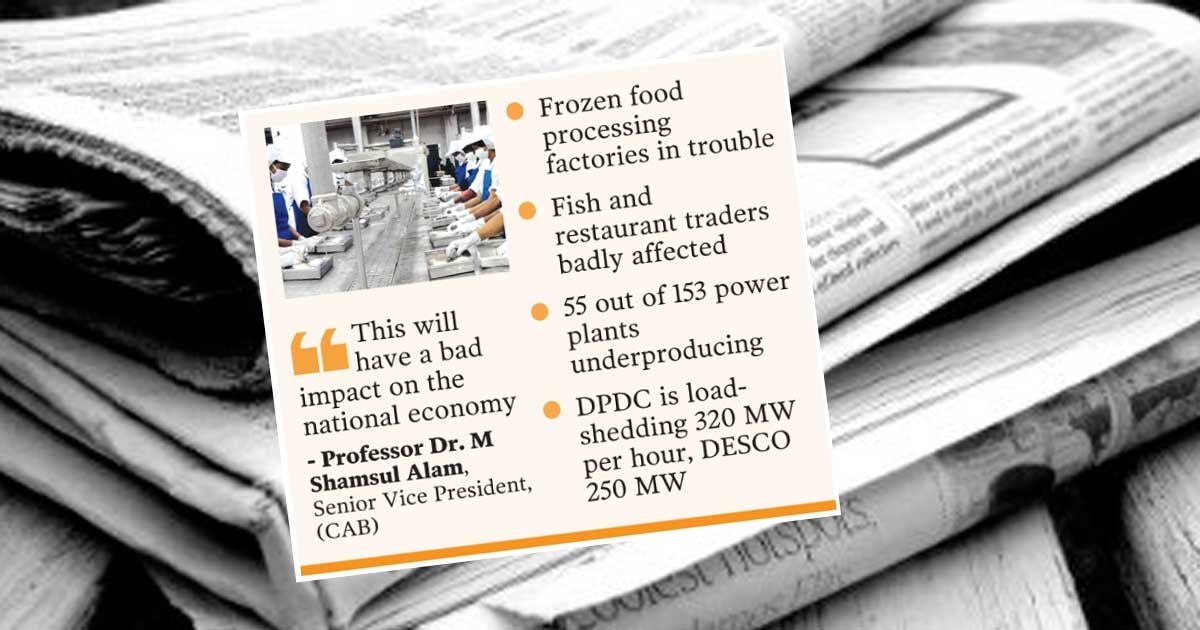-
Frozen food processing factories in trouble
-
Fish and restaurant traders badly affected
-
55 out of 153 power plants underproducing
-
DPDC is load-shedding 320 MW per hour, DESCO 250 MW
-
This will have a bad impact on the national economy - Professor Dr. M Shamsul Alam, Senior Vice President, (CAB)
Due to the energy crisis in the country, there is a big shortage of electricity. As a result, eight to 10 hours of load shedding has to be done a day. The country's food safety system is in shambles. Experts say the time has come for massive subsidies in the energy sector. Because without energy security, the country's food security and economy are at risk.
Food and production raw materials are wasted due to frequent power outages. Traders are afraid of the spoilage of frozen food and medicine.
Director of Bangladesh Frozen Foods Exporters Association (BFFEA) S. Humayun Kabir said, being a rotten product, prawns have to be stored at the right temperature. Besides, each step of shrimp processing requires electricity. He said, to keep the oxygen level in the water of the shrimp enclosure, an electric aerator (air carrier) has to be used all the time. Load shedding reduces shrimp production, sometimes killing them all.
Kashem, an ice trader, told the Daily Post, "I deliver ice to Jatrabari fish wholesale market. A factory requires 18 continuous hours of uninterrupted power to freeze ice. Due to load shedding, generators have to be used to make ice. As a result, the price of ice has increased a lot.”
There are a total of 105 frozen food processing plants in Bangladesh. Out of this, 80 percent of shrimp are processed in various factories in Khulna.
Kanta, a resident of Kazipara in the capital, said that the power goes out 6 to 7 times a day. Besides, load shedding is also happening at night. It causes many problems in daily work. Due to the lack of electricity, the condition of the refrigerator food spoilage. Victims say the fridge cannot be opened. The food in the fridge is getting spoiled due to a lack of electricity.
Mailbag hotelier Amir Hossain told Daily Post over the phone that due to load shedding, he is constantly in trouble. The generator has to be turned on repeatedly. The food in the fridge is spoiling. It has to face losses every day. He said hotel-restaurant kitchens are already hot. Only the workers know what happens when there is no power. Production is disrupted due to a lack of electricity.
People of all ages suffer due to load shedding. The workers say that the problems of common people are increasing. Because it is impossible to sleep in the heat due to load shedding at night. This makes it difficult to work during the day.
In the capital, DPDC load shedding 320 MW per hour and DESCO load shedding about 250 MW per hour. According to experts, the energy sector should be seen as a service sector. Otherwise, the economy will be fragile. Currently, at least 55 of the country's 153 power plants are forced to produce less than their capacity. The main reason is the shortage of gas, coal, and oil. Due to this load-shedding is grinding the countrymen.
Energy expert and senior vice president of the Consumer Association of Bangladesh (CAB) Professor Dr. M Shamsul Alam said that if there is an energy crisis, it will have a bad impact on the national economy. In this sense, this sector should be reformed. What has been done in the past has to be evaluated.
JH






